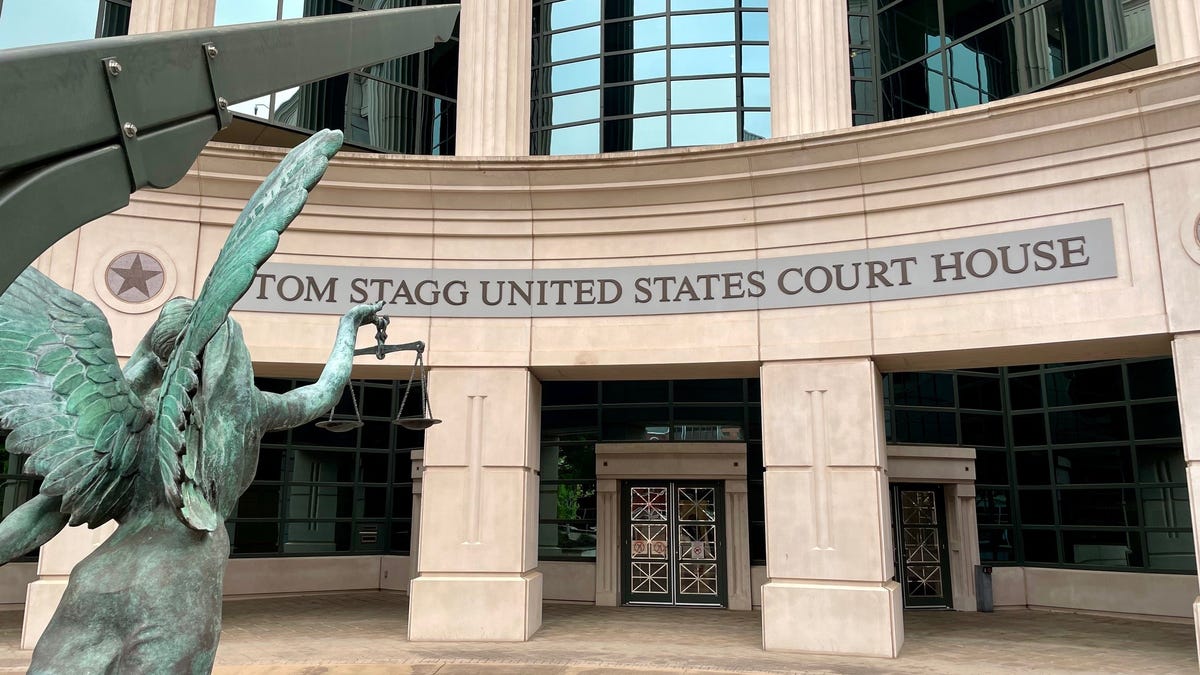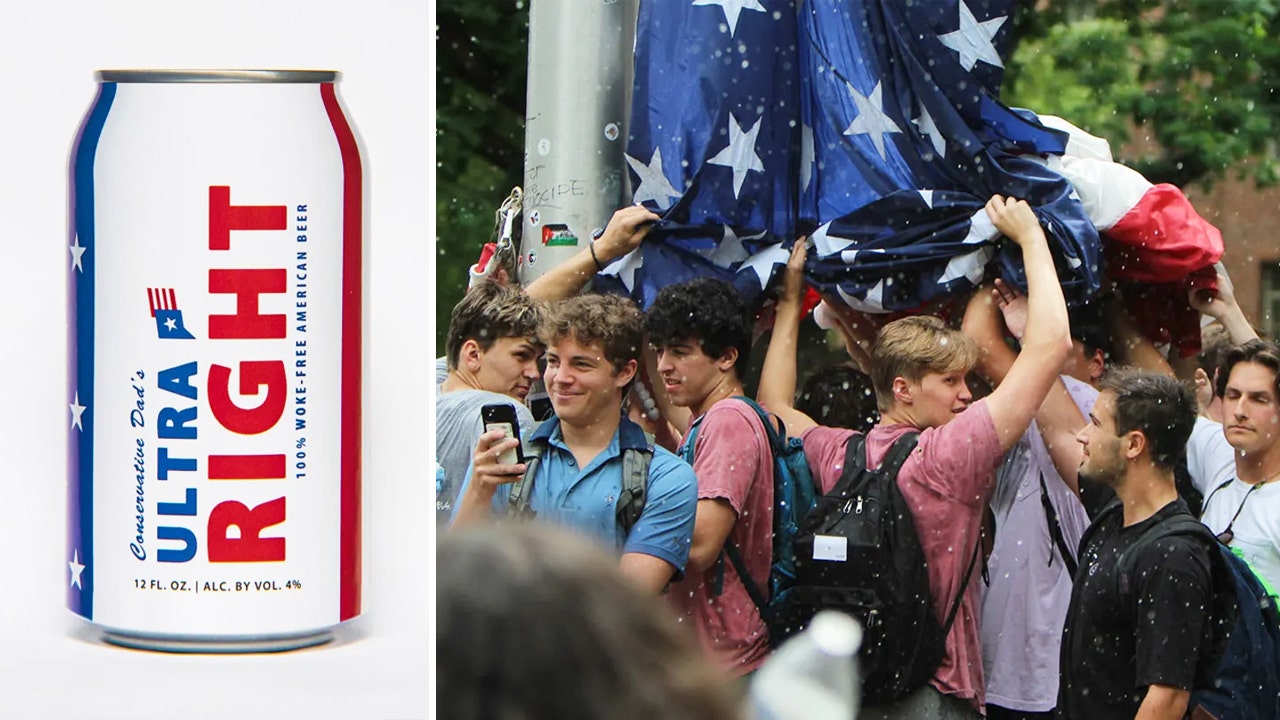California
New rules approved to reduce air pollution from ships at California ports

In a move cheered by environmentalists and public health groups but opposed by the oil industry, the Biden administration has approved new rules aimed at reducing the amount of air pollution emitted by large ships when they are docked at ports along the state’s coastline.
The ships — which can be more than 800 feet long and 100 feet wide — emit soot from huge diesel engines and boilers when they are sitting at the dock, sometimes for days. That pollution can affect communities in waterfront cities like Oakland, Richmond, Los Angeles, Long Beach and San Diego, increasing the risk of asthma, heart attacks and other health problems.
Since 2007, California has required large cargo ships and cruise ships to plug in to the local power grid to obtain electricity when they arrive at a port, so their engines and boilers don’t idle, a practice that reduces air pollution.
The new rules, approved by the U.S. E.P.A. on Wednesday and published in the Federal Register on Friday, expand those requirements to include oil tankers, chemical tankers and car-carrying ships. They will be phased in between now and Jan. 1, 2027.
Officials with the California Air Resources Board say tankers and car carriers emit 56% of all the particulate pollution from ships at berth in California, and that the new rules, which it passed in 2020, will save 237 lives, and yield $2.3 billion in public health savings by 2032.
“Pollution from ocean-going vessels is causing poisonous air for people living near the ports and is increasing regional smog,” said Bill Magavern, policy director at the Coalition for Clean Air, an environmental group with offices in Sacramento and Los Angeles. “This rule will help people in port communities and in California coastal regions breathe healthier air.”
Air pollution in port cities spiked during the COVID pandemic, when dozens of ships backed up at ports.
The shipping industry opposed the new California rules. It objected to the way that emissions are calculated. Under the original rule, total emissions from a company’s shipping fleet at the dock had to be reduced 50% by 2014 from 2007 levels, then 70% by 2017 and 80% by 2020. The new rule requires a 90% reduction, but from each ship, rather than from a fleet average, said Mike Jacob, vice president of the Pacific Merchant Shipping Association, an industry group in Oakland.
“We already are under an existing rule,” Jacob said. “We think the way it occurs right now is better. We have invested over $1.5 billion in shore-power infrastructure. We felt going through another process for determining whether or not you are compliant was like ‘if it ain’t broke don’t fix it.’”
The oil industry is suing over the new rules.
A tanker can comply if it either plugs into the power grid at the dock, or if it puts in place an exhaust-scrubbing device that captures the fumes from its diesel engines and boilers and cleans them.
In September 2020, the Western States Petroleum Association sued the California Air Resources Board, claiming that the technology hasn’t been invented yet for such scrubbing devices to meet the tough standards that the air board imposed.
The association, whose members include companies like Chevron and ExxonMobil, lost that lawsuit in Los Angeles County Superior Court. In March, it filed an appeal.
“Right now the technology doesn’t exist to the degree that the emissions have to be capped,” said Kara Greene, a spokeswoman for the Western States Petroleum Association. “The air resources board says it will be. But there are no venders for it now.”
Environmental groups note that the California Air Resources Board, first established by former Gov. Ronald Reagan in 1967 to reduce smog, often passes rules setting standards higher than current technology can achieve. The goal is to push industry to invent it by a looming deadline.
In recent years, as California’s smog levels have fallen, the agency has continued to tighten regulations on a wide variety of sources of soot pollution — called particulate pollution — including from trucks, locomotives and other sources. Such pollution can lodge deep in the lungs of people who regularly breathe it, increasing the risk of asthma, cancer, heart attacks and other ailments, particularly in low-income communities near ports, freeways, power plants, factories and rail yards.
Under the federal Clean Air Act, signed by former President Richard Nixon in 1970, California is allowed to set its own air pollution rules that are tougher than federal standards. If the U.S. E.P.A. approves, then other states can copy California’s rules.
The Trump administration worked to deny California rules for autos, but the Obama and Biden administrations have approved them. Oftentimes, when California’s more stringent smog rules go into force, at least a dozen other states, including New York, copy them, and they eventually become the national standard.
Environmental groups this week urged other states to copy California’s new shipping pollution rules. They also urged California regulators to impose additional smog rules on ships as they sail through state waters, not just when they are sitting at the dock.
“It’s always good to see California in the driver’s seat on air pollution issues, and it’s especially good to see E.P.A. back the Golden State,” said Regina Hsu, a senior attorney with Earthjustice, an environmental group based in San Francisco.

California
3 bodies discovered in Baja California during search for missing surfers

Three bodies were found Friday during an ongoing search for a group of surfers who went missing in Baja California, officials said.
Mexican authorities have yet to confirm if the bodies are those of San Diego resident Jack Carter and his companions from Australia, Callum and Jake Robinson.
State Attorney General Maria Elena Andrade said forensic exams were ordered to identify the bodies.
“We are in contact with the family of the U.S. Citizen, and we are steadfast with our international law enforcement partners in finding answers,” FBI officials said in a statement on Friday.
The search for the men began at the end of April when family and friends reported losing contact with them.
Callum and Jake Robinson are from Australia. Friends say Callum lived in Ocean Beach, and his brother was visiting. They say the brothers’ friend, Carter, is also from the San Diego area.
Friends and family said the group was on a surfing trip to celebrate a birthday. They said they last heard from the group on April 27 and grew worried when they didn’t check into their Airbnb in Rosarito as planned and when Callum did not return to work in San Diego.
According to the Baja California state attorney general, three people are under investigation, and arrest warrants were secured for the charge of forcible disappearance of people.
The FBI said it is working with Mexican authorities on the investigation.
This article was originally published by Athena Jreij and Laura Acevedo for Scripps News San Diego.
California
University of California police union blasts UCLA admin for 'lack of response' to violence at campus protests
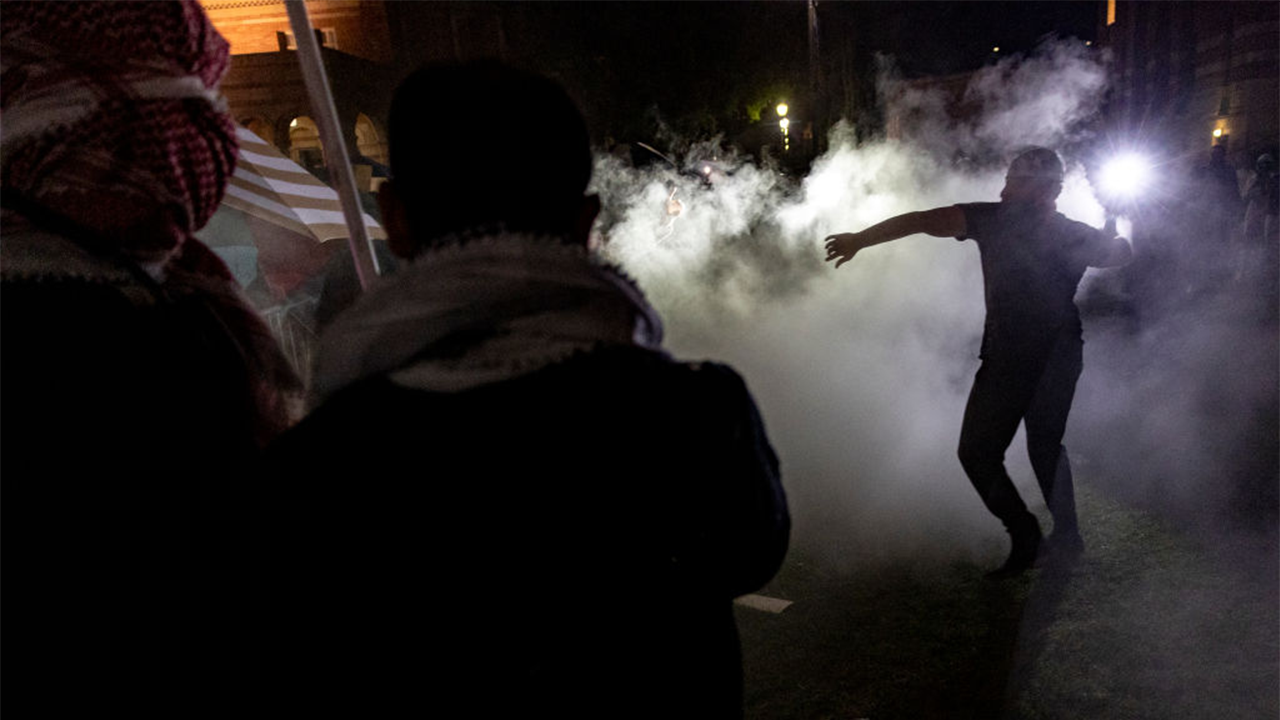
The police union representing officers at University of California schools is criticizing UCLA administrators for the “lack of response” to violence that broke out at anti-Israel student protests on campus last week.
The union also called for an independent investigation into the response.
“UC administrators are solely responsible for the University’s response to campus protests, and they own all the fallout from those responses,” Federated University Police Officers Association president Wade Stern said in a press release Saturday.
Hundreds of pro-Palestine demonstrators set up an encampment on UCLA’s campus in Royce Quad last week to demand that the university divest from companies and institutions that are “complicit in the Israeli occupation, apartheid, and genocide of the Palestinian people.”
UCLA STUDENT SLAMS UNIVERSITY FOR ‘ENCOURAGING VIOLENCE,’ TURNING CAMPUS INTO ‘WAR ZONE’: ‘THIS IS A DISGRACE’
Police at UCLA were given permission to clear a massive anti-Israel demonstration. (Photo by ETIENNE LAURENT/AFP via Getty Images)
Early Wednesday morning, pro-Israel counter-protesters attacked the encampment, which started a clash between them and the anti-Israel protesters, Fox 11 reported. Fights broke out, fireworks were shot at demonstrators and items were thrown as part of the violence.
Law enforcement initially stood by while the violence unfolded, according to Fox 11. Local police in riot gear did not respond to the scene until hours later. Law enforcement eventually moved in and cleared the encampment, and more than 200 protesters were arrested.
“”In the end, the encampment on Royce Quad was both unlawful and a breach of policy.,” UCLA Chancellor Gene Block said in a statement Thursday. “It led to unsafe conditions on our campus and it damaged our ability to carry out our mission. It needed to come to an end.”
Students told Fox 11 they were frustrated about the lack of response by the university. One security guard on campus said UCLA “could have stopped this a long time ago.”
California Gov. Gavin Newsom, a Democrat, condemned the violence and called for an investigation into the university’s response.
UCLA FALLS TO ANARCHY AFTER COUNTERPROTESTERS CONFRONT ANTI-ISRAELI ENCAMPMENT: ‘HORRIFIC ACTS OF VIOLENCE’
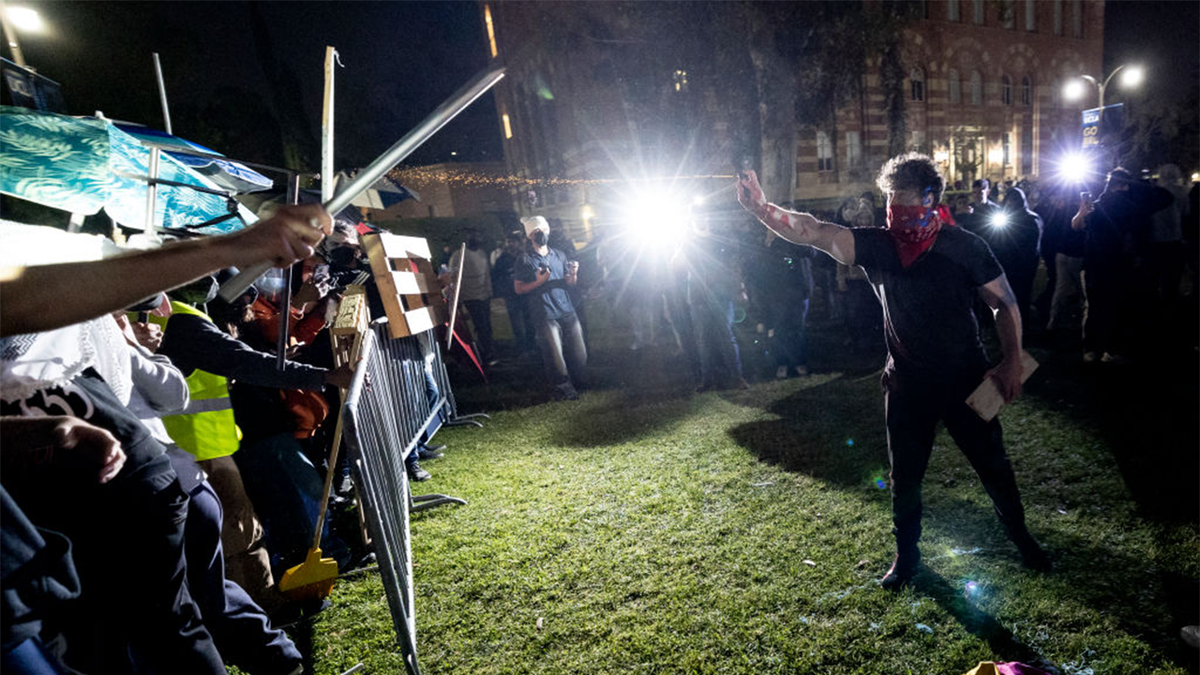
Clashes broke out on May 1, 2024, around pro-Palestinian demonstrations at the University of California, Los Angeles, as universities around the United States struggle to contain similar protests on dozens of campuses. (ETIENNE LAURENT/AFP via Getty Images)
University of California President Michael Drake said in a statement Wednesday that he has “requested a detailed accounting from the campus about what transpired” and that he is “ordering an independent external review of both UCLA’s planning and actions, and the effectiveness of the mutual aid response.”
The police union said in its statement Saturday that the investigation will “undoubtedly uncover multiple failures to implement and adhere to UC’s own guidelines for response to campus protests.”
According to the union, University of California policy states that each school is responsible for establishing a task force to respond to student protests on campus, but that those task forces have not been trained since 2020. The union said the University of California and its campuses “have not funded any training.”
CALIFORNIA STATE OFFICIALS CONDEMN VIOLENT ANTI-ISRAEL PROTESTS AT UCLA
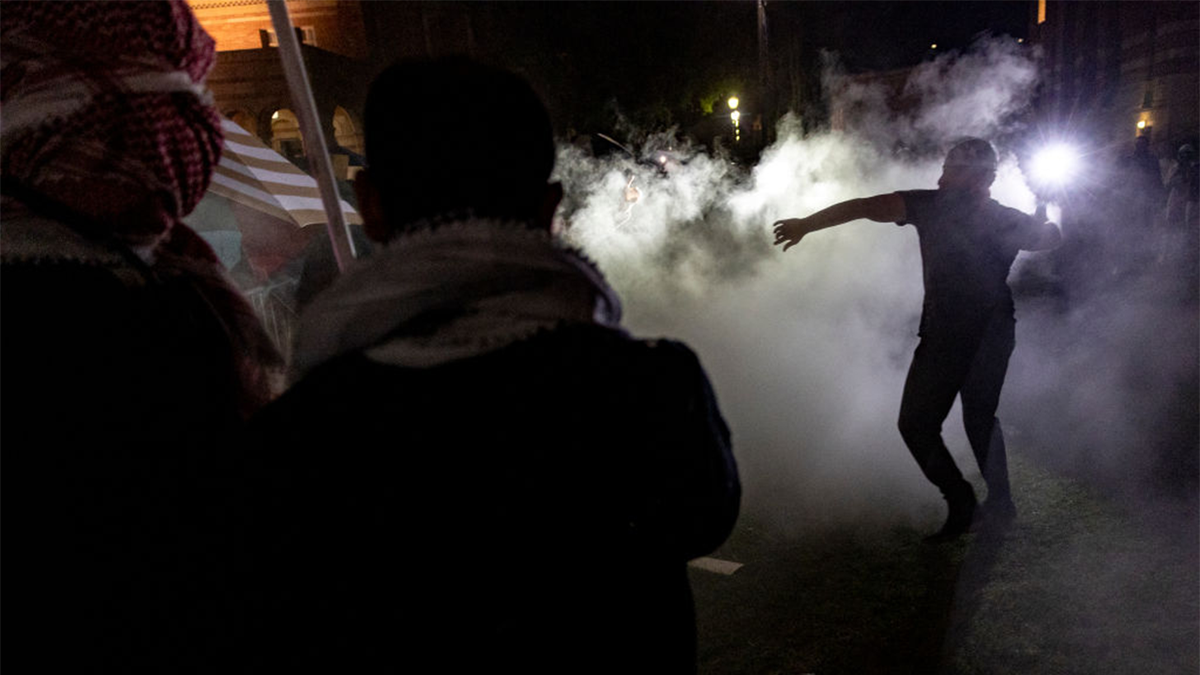
Counter-protesters attack a pro-Palestinian encampment set up on the campus of the University of California Los Angeles (UCLA) as clashes erupt, in Los Angeles on May 1, 2024. (ETIENNE LAURENT/AFP via Getty Images)
CLICK HERE TO GET THE FOX NEWS APP
The union also claimed that administrators told campus police to “stand down and stand aside” during the campus protests. The union said a Jewish student who called police asking for help because he was being blocked from a campus library was told by the dispatcher that administrators had told campus police not to intervene.
“The UCLA administration has much to answer for in the upcoming probe, and their adherence to established guidelines should play a central part,” the union’s statement said.
California
California Man Indicted For Allegedly Making Threats To Georgia Prosecutor In Trump Election Case

ATLANTA (AP) — A California man has been indicted by a federal grand jury in Atlanta for sending death threats to District Attorney Fani Willis, who is overseeing the prosecution of former President Donald Trump and 18 others on charges of illegally trying to overturn the 2020 presidential election in Georgia.
Marc Shultz, 66, of Chula Vista, is facing charges of transmitting interstate threats to injure Willis. Prosecutors alleged that Shultz posted comments to YouTube livestream videos in October 2023 that threatened Willis, including stating that the prosecutor “will be killed like a dog.”
“Sending death threats to a public official is a criminal offense that will not be tolerated,” Ryan Buchanan, the U.S. attorney in Atlanta, said in a statement Friday.
The April 24 indictment was unsealed Thursday. A federal public defender listed as representing Shultz didn’t immediately return emails seeking comment.
Records show Shultz appeared before a judge in San Diego on Thursday and was released on bail. Buchanan said Shultz would be formally arraigned in Atlanta in June.
Also Friday, Fulton County leaders testified before a special state Senate committee that they had no legal power to control Willis’ spending or her hiring of former special prosecutor Nathan Wade.
The Republican-led committee is probing Willis’ hiring of Wade to lead the team that investigated and charged Trump, lawyers and other aides in the Georgia case. Willis and Wade have acknowledged a romantic relationship with each other.
Trump and some other defendants in the case have tried to get Willis and her office removed from the case, saying the relationship with Wade created a conflict of interest.
Wade stepped down from the prosecution after Fulton County Superior Court Judge Scott McAfee in March found that no conflict of interest existed that should force Willis off the case. But he ruled that Willis could continue prosecuting Trump only if Wade left. Trump and others are appealing that ruling to a higher state court.
The allegations that Willis had improperly benefited from her romance with Wade resulted in tumultuous months in the case as intimate details of Willis and Wade’s personal lives were aired in court in mid-February. The serious charges in one of four criminal cases against the Republican former president were largely overshadowed by the love lives of the prosecutors.
ALEX SLITZ via Getty Images
Willis told reporters Friday that she had done nothing wrong.
“They can look all they want,” Willis said. “The DA’s office has done everything according to the books. We are following the law. I’m sorry that folks get mad when everybody in society can be prosecuted.”
Willis is running for reelection this year and faces a Democratic opponent, Christian Wise Smith in a May 21 primary. Early voting for that election is ongoing.
But the lawyer who initiated the effort to remove Willis, Ashleigh Merchant, has also claimed that Wade’s firing violated a state law that required approval of the hiring of a special prosecutor by the county commission.
Fulton County Commission Chairman Rob Pitts, a Democrat, and Fulton County Attorney Soo Jo both told the committee that while the law appears to require county commission approval, judges decades ago interpreted the law in such a way to give Willis the freedom to hire who she wants without approval. Jo, who represents the commission, cited three separate Georgia Court of Appeals cases backing up that point
“What I have found is that the court has rejected the proposition that this particular statute requires a district attorney to obtain explicit permission from a county prior to appointing a special assistant district attorney,” Jo said.
State Sen. Bill Cowsert, the Athens Republican who chairs the committee, disputed that interpretation when questioned by reporters after the hearing.
“I think the clear language of the statute says that that requires county approval, and especially where it’s funded by the county,” Cowsert said.
He went on to suggest the committee, which doesn’t directly have the power to sanction Willis, might change the law to give counties more control over spending by state officers funded by counties, including district attorneys and sheriffs. Fulton County officials said they don’t believe they currently can control how Willis spends money once it’s appropriated to her.
Cowsert said increased county oversight would be “extraordinarily complex” for district attorneys managing funds contributed by more than one county. While Willis and 15 other district attorneys in Georgia only prosecute cases from one county, others prosecute cases from as many as eight counties.
Senate Democratic Whip Harold Jones II of Augusta said the hours of questioning over details of how Fulton County budgets money shows the panel is “on its last legs,” noting three of six Republicans didn’t appear for a committee meeting called on short notice.
“They’re not even interested in this anymore,” Jones said. “There’s nothing else to talk about, quite frankly. And we found that out today.”
-

 World1 week ago
World1 week agoEU Parliament leaders recall term's highs and lows at last sitting
-

 Movie Reviews1 week ago
Movie Reviews1 week agoAbigail Movie Review: When pirouettes turn perilous
-

 Politics1 week ago
Politics1 week ago911 call transcript details Democratic Minnesota state senator’s alleged burglary at stepmother's home
-

 Politics1 week ago
Politics1 week agoGOP lawmakers demand major donors pull funding from Columbia over 'antisemitic incidents'
-

 World1 week ago
World1 week agoHamas ‘serious’ about captives’ release but not without Gaza ceasefire
-

 Sports1 week ago
Sports1 week agoWhy drafting a successful NFL quarterback remains 'an inexact science'
-

 Tennessee1 week ago
Tennessee1 week agoHow to buy JC Latham’s Tennessee Titans jersey after 2024 NFL Draft selection
-

 Politics6 days ago
Politics6 days agoHouse Republicans brace for spring legislative sprint with one less GOP vote

